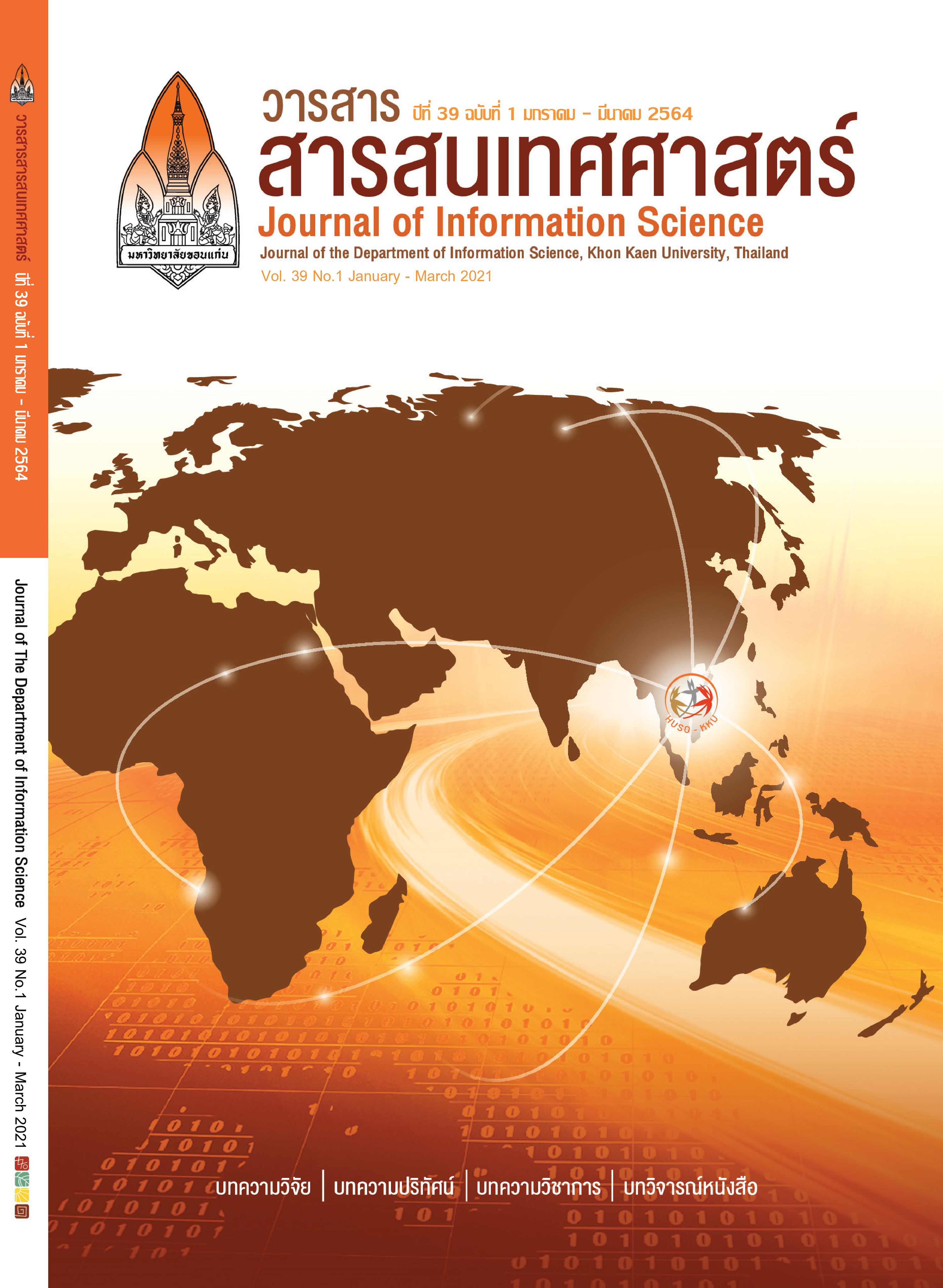Information System for Managing the Curriculum Self-assessment Report
DOI:
https://doi.org/10.14456/jiskku.2021.2Keywords:
Information System for Managing, Curriculum Self-assessment ReportAbstract
Purpose of the study: This exploration focuses on developing the information system for managing the preparation of self-assessment report at a study program level.
Methodology: This research is based on the Agile work process concept consisting of 6 steps: 1) examining data from concerned individuals 2) planning 3) analyzing 4) developing 5) system testing and 6) system evaluating. Apart from this, self-assessments of 21 programs of studies of the Faculty of Humanities and Social Sciences of Khon Kaen University were undertaken as case studies in 2018. Seventy-four informants who were responsible for the preparation of SAR-TQF7 participated in each step of the information system development. In addition, data collection was gathered through interviews, group discussions, and questionnaires. Also tools for the information system development included workflows, data flow diagram, entity relation diagram, and Microsoft Visual Studio Code.
Main findings: The information system developed for the management of self-assessment report is composed of 4 sub-systems:1) SAR-TQF7 data management 2) quality auditor data management 3) quality auditing data management and 4) staff/user data management. In addition, the analysis of the evaluation of the information system effectiveness and user satisfaction reveals that the system quality is rated at a good level and the benefits of the system at a very good level.
Applications of this study: This CSAR system makes a good contribution to the preparation of self-assessment report of any study programs of a university by modifying its data compatible with existing databases of the institution.
Downloads
References
Beck, K. et al. (2001). Manifesto for Agile Software Development. Retrieved 2 June 2020, from http://agilemanifesto.org
Bureau of Higher Education Standards and Evaluation. (2014). Announcement of the Committee on Higher Educational Internal Quality Assurance, B.E. 2014. Retrieved 3 May 2019, from http://www.mua.go.th/users/bhes/data%20bhes2558/upload%
file%20iqa/notice%20iqa22122557.pdf
Chaochaikong, S. (2015). Analysis of information used for quality assessment of Rajabhat Universities. KKU Research Journal (Graduate Studies), 15(1), 1-17.
Chumnanmak, R. (2019). Interview. Program Committee, the Doctor of Philosophy Program in Sociology, Faculty of Humanities and Social Sciences, Khon Kaen University, 8 February 2019.
DeLone, W.H., & McLean E.R., (2003). The DeLone and MacLean model of information systems success : a ten-year update. Journal of Management Information Systems, 19(4), 9-30.
Jaipakdee, J. (2010). Case study of applications of agile project management for software development in Thailand. Master of Science in Project Management. Bangkok: Graduate School of Management and Innovation, King Mongkut's University of Technology Thonburi.
Khampachua, T. (2018). Continuous information technology competency assessment in agile software development life cycle for individual development planning in public sector. Doctor of Computer Education. Bangkok: King Mongkut’s University of Technology North Bangkok.
Kittiwimonchai, P. (2018). A study of curriculum administration according to the internal quality assurance system and guidelines for curriculum development: a case study of Khon Kaen University. Journal of Education Research Faculty of Education, Srinakharinwirot University, 13(2), 109-125.
Lehman, T.J., & Sharma, A. (2011). Software development as a service: agile experiences. Proceedings of 2011 Annual SRII Global Conference, California, 2011. Retrieved from https://ieeexplore.ieee.org/ document/5958156
Ministry of Education. 2010. Ministerial Regulations on the system, criteria and methods for educational quality assurance, B.E. 2553. Retrieved 4 May 2019, from http://www.mua.go.th/users/bhes/front_home/ qa_02042553.pdf
Ministry of Education. (2018). The standards for higher education and related criteria standards. Retrieved 11 November 2019, from http://www.bhes.mua.go.th/front_home/ST.HED.pdf
Ministry of Education. (2019). Act of National Education (Issue 4), B.E. 2562. Retrieved 9 May 2019, from http://www.ratchakitcha.soc.go.th/DATA/PDF/2562/A/057/T_0049.PDF
Nirarach, S., Areerad, W., & Keawbandon, B. (2016). The development of information systems for internal quality assurance at the curriculum level. Journal of Technology Management Rajabhat Maha Sarakham University, 3(1), 26-34.
Office of Quality Management, Khon Kaen University. (2019). Guidelines for internal quality assurance at the curriculum level according to the standards for higher education. Khon Kaen: Khon Kaen University. (Unpublished).
Project-Management.Com (2019). Top 10 Agile Development Methodology & Principles. Retrieved 15 July 2020 from https://project-management.com/10-key-principles-of-agile-software-development/
Thupa-ang, A. and Lucas, L. (2017). The quality of teaching and quality assurance in higher education in Thailand: an exploration of academic perceptions and experiences. Journal of Education, 18(2), 243-257.
Tongpoon-Patanasorn, A. (2019). Interview. Associate dean of Academic Affairs of Faculty of Humanities and Social Sciences, Khon Kaen University, 7 February 2019.
Tuamsuk, K. (2019). Guidelines for Educational Quality Assurance for the Faculty of Humanities and Social Sciences, Khon Kaen University. Khon Kaen: Khon Kaen University. (Unpublished).








